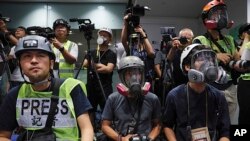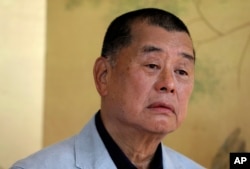Global media watchdog Reporters Without Borders, or RSF, says press freedom in Asia continues to see a decline, with 26 out of 31 countries falling on its annual index.
According to the group’s latest press freedom index, Asia is the second-most difficult region for practicing journalism. Five countries in the region — Myanmar, China, North Korea and Vietnam — are among the world’s 10 most dangerous countries for media professionals in the 2024 rankings.
There are no countries in the Asia-Pacific region in the top 15 ranking for press freedom.
China, North Korea and Vietnam, three of the world’s remaining communist governments, have long been near the bottom of RSF’s press freedom index ranking of 180 countries. This year, China was ranked 172, Vietnam 174 and North Korea 177.
Overall, it’s the countries and territories that have shown a drop in press freedom in recent years that have contributed to East Asia becoming a difficult place for media to operate.
Hong Kong was once a model for press freedom in the Asia region, but the city’s ranking recently dropped from 80 to 148 following political unrest and new laws that affect media freedoms.
Since the Beijing-imposed national security law came into force in 2020, at least a dozen media outlets have closed. Beijing says the law has been necessary to stabilize the city following mass political unrest in 2019.
Aleksandra Bielakowska, an advocacy officer at RSF, said Hong Kong’s media freedoms still haven’t improved.
“The worst for Hong Kong is the political and legal factors. Hong Kong’s position is very low; the situation remains very difficult,” she told VOA.
Hong Kong is in the middle of two high-profile national security trials. Jimmy Lai, the media mogul and founder of the now-defunct Apple Daily newspaper, faces national security charges for “collusion with foreign forces” that could see him sentenced to life in prison. Stand News, which ceased operations in 2021 after a police raid, is also on trial, with its chief editors facing charges under Hong Kong’s colonial-era sedition law. The verdict was recently postponed until August.
Hong Kong’s Justice Secretary Paul Lam recently said that press freedom still exists in the city and that media can criticize the government.
But Emily Lau, a former journalist and former chair of Hong Kong’s Democratic Party, said many reporters are unsure whether that is the case.
“There is concern. I don’t know whether that is reassuring. Journalists themselves are concerned. People are not sure whether it is really true,” she told VOA.
Due to the sensitivity of the cases and concerns over press freedom, several media experts in Hong Kong declined to speak to VOA when requested.
Although RSF ranked Hong Kong up five spots to 135 in 2024, that doesn’t mean press freedoms have improved.
“The reasons for that are because of the movement of other countries inside the index itself,” Bielakowska said.
RSF said the deteriorated media environments in Afghanistan, Syria and Eritrea, which are the bottom three countries of the rankings, have pushed other countries further up the list.
The same can be applied with Myanmar. The new RSF rankings puts Myanmar up two places to 171, but it doesn’t mean press freedom is improving.
Today, the Southeast Asian country is the world’s second-worst jailer of journalists, only behind China, according to the Committee to Protect Journalists.
Following a military coup led by General Min Aung Hlaing and his troops in 2021, Myanmar’s junta has been accused of arbitrary arrests, harassment and torture, while at least four journalists have been killed by the military, rights groups say.
At least a dozen media outlets have had their licenses revoked by the military government in three years, while hundreds of journalists have been arrested.
Media outlets who are allowed to legally report in Myanmar must be registered with the military government to operate. But registering for press accreditation means journalists must provide the junta with their personal details, which discourages them from doing so over fear of arrest. For the journalists who have continued to report, they have had to work “undercover” to avoid being targeted by military personnel.
Aung Naing Soe, a Myanmar reporter, said journalists are a “primary threat” toward the military’s attempts to rule.
“The junta arrests not only journalists but everyone against them. They see journalists as one of their primary threats since before the coup,” he told VOA.
Since the junta attempted to rule, ousted politicians formed a civilian-led government, while civilian defense forces and ethnic political groups have taken up arms against the military.
But Aung Naing Soe, who is also the filmmaker of the documentary “Undaunted” —about the uprising against military rule — added that the difficulties in reporting come from both sides.
"Everybody knows the risks from the military's intimidation. We expected a little bit of press freedom from the revolutionary groups, but lately we've started seeing some [rebel] groups attempt to control the media," he said.
"Like everyone else in the country, Myanmar journalists are getting tired. Sometimes we don't have any energy left to write a short story or make a short interview. We're all emotionally drained."
There was some encouraging news for media freedom in East Asia. Thailand saw the biggest jump in the 2024 rankings, moving up 19 spaces to 87. Thailand’s security performance was one of the main reasons for the jump, according to Bielakowska.
“There was less violence than in other years, and the electoral campaign for the general elections of May 2023 did not result in demonstrations of violence against journalists,” she said.
On the other hand, she said that despite the political transition, there has not been notable improvement in the overall political environment.






